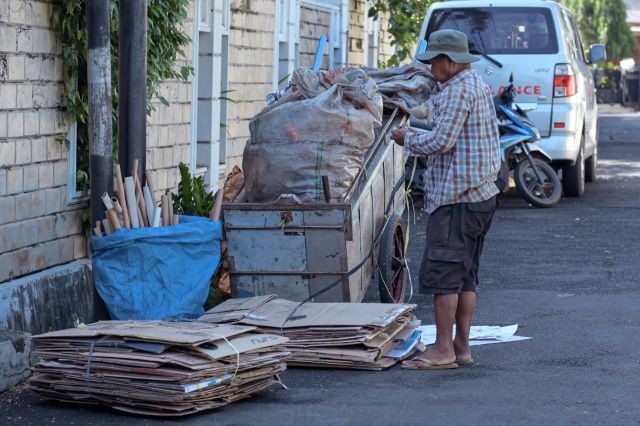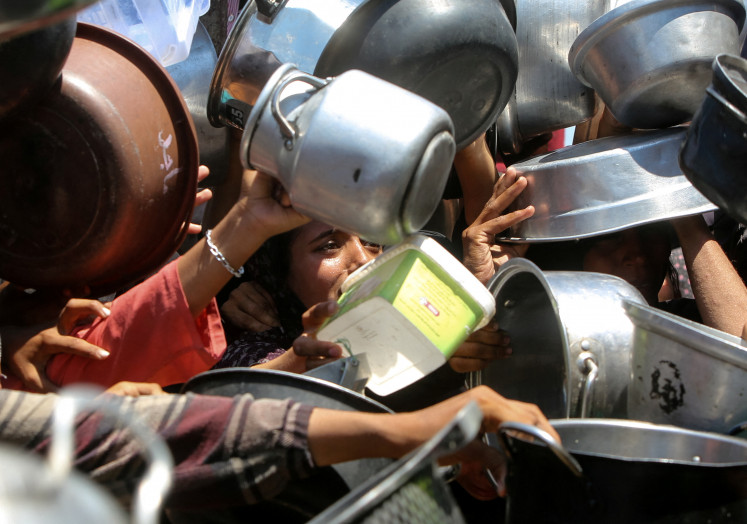Popular Reads
Top Results
Can't find what you're looking for?
View all search resultsPopular Reads
Top Results
Can't find what you're looking for?
View all search resultsHow biotechnology can save farmers, the nation
It is a sobering reality that Indonesian farmers’ livelihoods have never been under greater threat
Change text size
Gift Premium Articles
to Anyone
I
t is a sobering reality that Indonesian farmers’ livelihoods have never been under greater threat. The fact is that they are among the poorest people in the country and their situation has worsened of late by soaring food prices and unpredictable weather patterns.
This has major implications for our country. If the problem of farmers’ welfare is not addressed, Indonesia will have to import the majority of agricultural crops as the farming community will be unable to meet domestic demand.
Looking at the experience of other countries, biotechnology could be among the solutions for these alarming problems. The solution comes with a catch. The process of implementing biotechnology in
Indonesia has been hindered and delayed by debates about safety issues.
With the alarming state that our farmers are in, this implementation process has to be accelerated. All parties directly or indirectly affecting our agricultural sector need to understand that the longer we fail to address the problems relating to farmers’ welfare and agricultural production, the poorer our farmers and our nation will be.
How can biotechnology act as a concrete solution to food scarcity that could ultimately improve farmers’ welfare?
Fundamentally, biotechnology is a realistic solution for Indonesian land management. In the past, farmers have been required to ensure that their crops match the acidity of the land in which they are planted for them to be able to grow.
Biotechnology should be used to improve crops’ ability to grow in other environments. For instance, Indonesia has vast areas of peat land.
Rice and corn should be modified to be able to adapt and resist the acidity in these areas and still produce a profitable amount of crops. This would help to spread rice and corn production beyond those areas where production is currently concentrated, in Java.
Indonesia has been too dependent on production in Java, which is not ideal, considering the overuse of the existing land capacity in Java.
Farmers have also complained about unpredictable weather, where the periodic lack of sun has created an environment suitable for pests to flourish. Biotechnology-based production methods can help address this issue by modifying crops to become pest-resistant. In so doing, farmers will be able to maximize yield production and minimize the possibilities of failed harvests.
Other than pests, unpredictable weather has also caused misjudgments in determining crop cycles. Since 2010, we have had short dry seasons, which mean farmers can only grow crops once a year, instead of the regular two-cycle season. Biotechnology providers, however, have developed crops that are flood and/or drought resistant.
The Meteorology, Climatology and Geophysics Agency (BMKG) has said that this dry season trend will continue until 2015, so the nation’s farmers would be comforted by the knowledge that there is technology available to combat this distressing phenomenon.
However, there is a critical educational component required to ensure that these potential scenarios can be brought to fruition.
The key stakeholders, the government, academics, NGOs and the private sector need to work together to ensure that farmers have the support and guidance they need in the use of biotechnology from the very beginning.
We cannot ignore the fact that a lack of education has been an ongoing issue in the farming sector. To successfully implement biotechnology, it is essential for farmers to see and experience its benefits firsthand.
There have been incidents in farmer programs where a lack of continuous supervision has led to devastating results. For instance, during the implementation of hybrid plants, farmers did not understand that the crops produced could not be replanted, and this lack of knowledge led to failed production. Put simply, Indonesia cannot afford to not take the implementation of biotechnology seriously. It is essential for farmers to have access to information and biotechnology products.
In terms of first steps, a multi-stakeholder initiative, led by the government, should start in a remote area, possibly outside Java, where farmers would receive guidance, consultation and training in the use of biotechnology products in the production cycle, from working with the seed until the harvest and post-harvest period.
Once the farmers feel comfortable with these new procedures and the production of biotechnology-based crops, then the advisory team can start working with other groups.
If the training phase is structured properly, we can reach a significant number of farmers across the nation to provide them with the necessary information on the application and potential benefits of biotechnology. It is also important to note that farmers may have difficulty in accessing seeds for biotechnology crops.
The government needs to collaborate with the private sector to craft the law to ensure that farmers can gain straightforward physical access to biotechnology products. Past cases have shown us that counterfeit products can easily enter the market, ranging from herbicides and pesticides to seed-based products.
If biotechnology is to be successfully commercialized in Indonesia, government policies and procedures need to be able to monitor and evaluate the distribution of biotechnology products among our farmers.
If the actions outlined here are adopted, then we can start to predict a better future for our farmers, which will have knock-on benefits for the nation as a whole, from increased food production to less expenditure on unsuccessful agricultural initiatives. But, given the challenges the farming sector faces, the time for action is now.
The writer is chairman of the KTNA (Kelompok Tani Nelayan Andalan), the main representative body for farmers and fishermen in Indonesia










